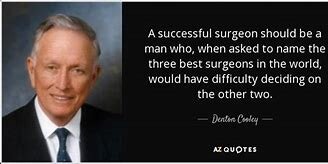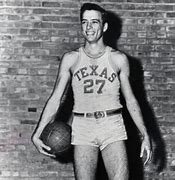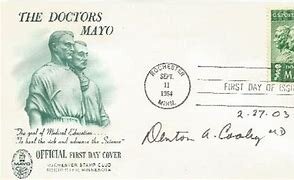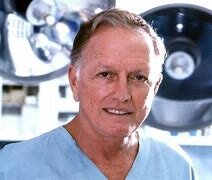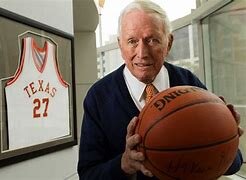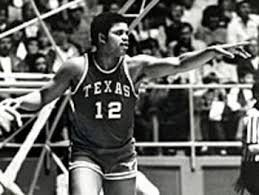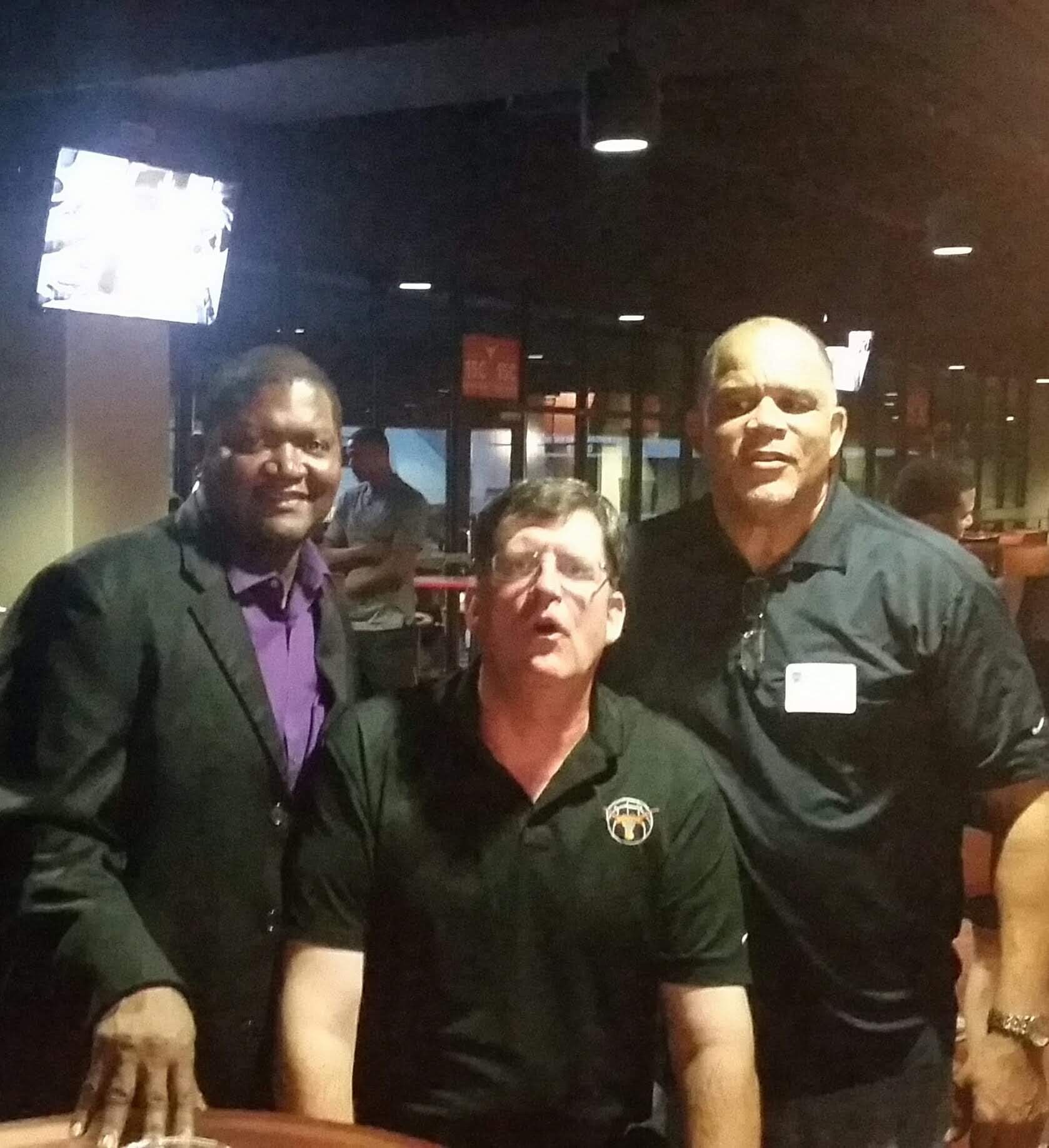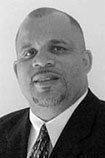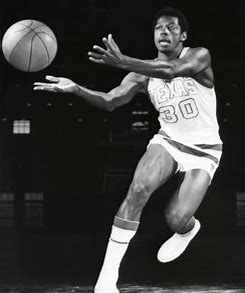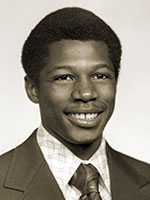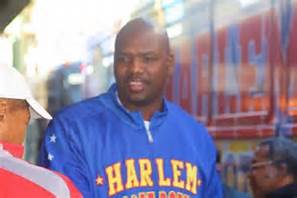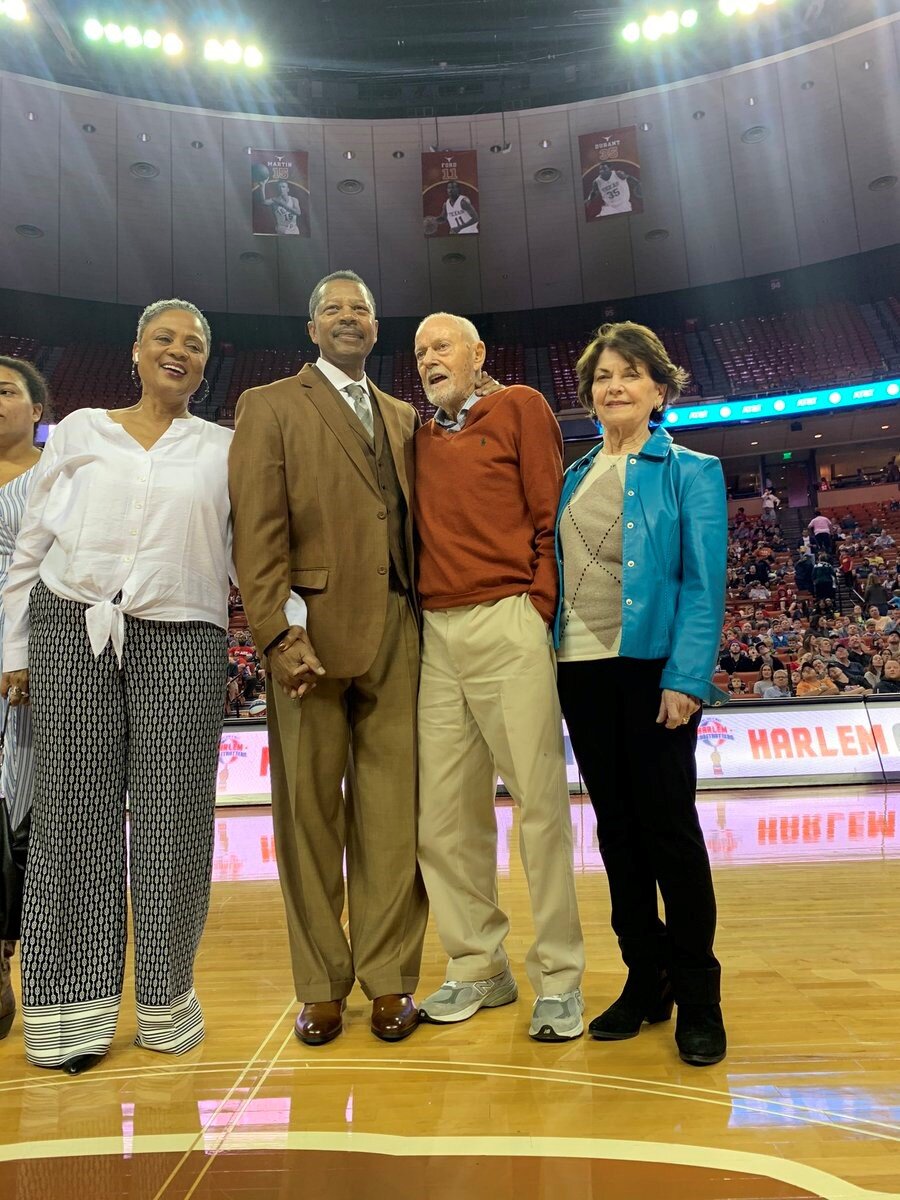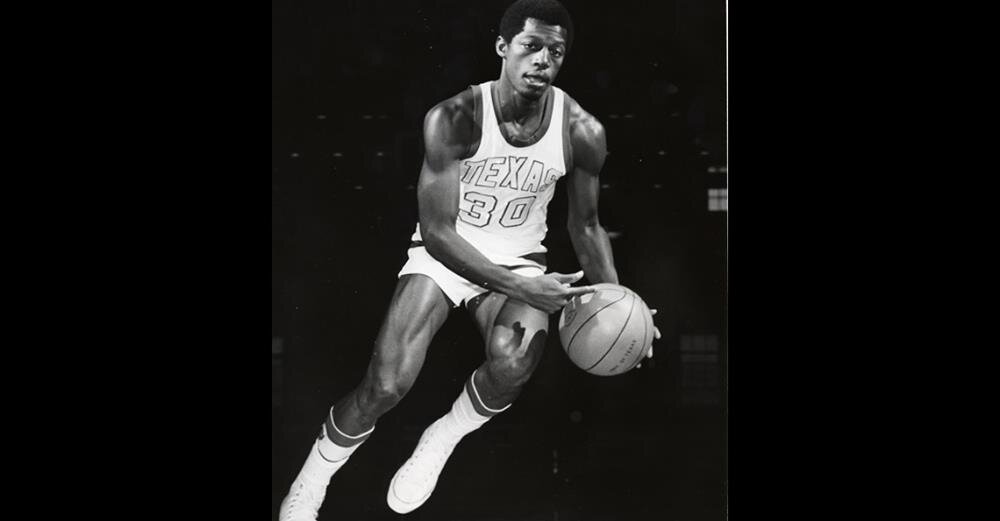Dr. Denton Cooley (1938-1939)
In 2004 the 44,000 square foot Denton A. Cooley Pavilion was dedicated. The facility is where both the women and men practice on separate courts. It was one of the best workout facilities in the country when built.
Denton Cooley wanted to be a jock, not a doctor in his younger years. Fortunately, the confused younger Cooley at Texas discovered the heart and became one of the most esteemed surgeons in the world.
Denton was a 6-4 walk-on center in 1939 and played an important role in winning the SWC championship and participating in the NCAA basketball tournament.
There were no flights to Madison Square Garden, so the team hopped on a train to play Manhatten College. The Horns won. The next day they played in Temple in Philadelphia and lost.
The Horns started the NCAA playoffs heading by train to San Francisco. Coach Gray noticed that Cooley was in the dining car eating buckwheat pancakes. Gray looked at Denton and said, “No buckwheat for you, Buckwheat!” The name stuck for the rest of his years at Texas.
When a Sooner helped the Horns
Meet Tyrone Branyan 1978
Pastor Gerald Mann at River Bend Church about the only factor athletes can control to achieve success.
““There are actually three ‘T’s,’ that play into success. The first is talent, The second is timing, and there is nothing you can do to control either of those. You either have talent, or you don’t, and timing is either right, or it is not.”
”The third is the one thing you can control,” Mann continued. “That’s trying or tenacity. That’s where you can make a difference.” ”
Coach Lemons probably would never have seen—or even heard of—Branyan had it not been for George Brewer, a friend of Tyrone's father and a former football teammate of Texas Athletic Director Darrell Royal. When Branyan was a sophomore at Cypress Junior College in California, Brewer wrote Royal about him, and Royal passed the letter on to Lemons.
Abe had never heard of Branyan, but the letter sounded so interesting that he sought a more detailed evaluation from Tyrone's junior-college coach. Lemons liked the coach's report enough that he gave Branyan a scholarship sight unseen. Only then did he dispatch Assistant Coach Barry Dowd to check him out.
Part of a Sports Illustrated article about #31 Tyrone Branyan #31 as told by Sports Illustrated.
IT'S NOT A LONE STAR STATE
THE LONGHORNS AND AGGIES ARE TIED FOR FIRST IN THE SWC, MAINLY BECAUSE OF A FORWARD WHO'S BETTER THAN HE THINKS HE IS AND A CENTER WHO MAY BE AS GOOD AS HE SAYS HE IS
By Larry Keith
6’7” Tyrone Branyan does not run fast or jump high or have a perfect shooter’s form but halfway thru the 1978 seasons he was leading the Longhorns with Tyrone averaging 18.2 points and 7.44 rebounds a game. Branyan plays a lot better than he looks
Texas Coach Abe Lemons took Branyan without ever having seen him play, which may have been to Lemons' advantage.
Lemons probably would never have seen—or even heard of—Branyan had it not been for George Brewer, a friend of Tyrone's father and a former football teammate of Texas Athletic Director Darrell Royal. When Branyan was a sophomore at Cypress Junior College in California, Brewer wrote Royal about him, and Royal passed the letter on to Lemons. Abe had never heard of Branyan, but the letter sounded so interesting he sought out a more detailed evaluation from Tyrone's junior college coach. Lemons liked the coach's report enough that he decided to give Branyan a scholarship sight unseen. Only then did he dispatch Assistant Coach Barry Dowd to check him out.
After watching Branyan play in a junior-college tournament, Dowd called Lemons and said, "Picture a guy who can't jump, can't run and shoots funny. Now picture him with 24 points, 17 rebounds and the Most Valuable Player trophy in the championship game."
Lemons was overjoyed—until he actually saw Branyan himself the next fall. As is his custom, Branyan was in poor shape when he showed up for preseason workouts, and he was anything but impressive on the practice floor. When he got a chance to play, Lemons says, "People were aghast." However, by the second conference game Branyan was a starter, and he finished the year with respectable averages of 12.8 points and 5.7 rebounds. "If Tyrone could jump up and spin around twice and then score," says Lemons, "everybody would ooh and aah. But he isn't that kind of player. He's exceeded my expectations by about a million."
The oddest thing about Branyan is the way he shoots his jump shot—off his chest. The best thing about him is the way his teams always win.
Respect is something Branyan has learned to live without. Instead of reveling in his success, he questions it, scoffing at the suggestion that he or his team is anything special. "It's hard for me to think we're as good as the top teams," he says. "I guess I still look up to those people, because I never thought I could play with them."
And Texas can thank Branyan for its semi-lofty status. He is averaging 18.2 points and 7.4 rebounds and has been the only consistent performer during Texas' 16-5 season.
Ron Baxter and Abe Lemons- A duo that changed The History of Longhorn Basketball.
In the book Abe Lemons Court Magician by Bob Burke and Kenny Franks, Abe Lemons is quoted as saying I like to recruit "a wild guy, somebody that's stung by a bee." "I like a wild horse that just tears up the gym." "I like people with unusual characteristics that you can calm down and help make something of." Abe liked players that had been given nicknames from his teammates, such as "adding machine" or the "helicopter."
On his first recruiting trip to California as the Longhorn head coach, he found an individual that qualified for his "type" of a recruit.
Ron Baxter was Abe Lemons's first great recruit at Texas. Ron was the high school co-player of the year in Los Angeles. Abe says, "I saw him (Ron) play against the Russians." "The Russians even brought their official." "Talk about a crook." The local paper after the game says, "Russians introduce six-man basketball to the U.S." Abe saw a lot of potential in Ron during the game, even though Coach Lemons criticized his play, saying, "Baxter passes too much" "Doesn't shoot enough." "Shot only twice against the Russian." "He made one." Abe knew that Ron was a great athlete, and he just needed a coach who would encourage him to shoot more.
For the rest of Ron's story, click on the Longhorn icon below, and you will go right to the article.
Ron says he chose UT over other schools because Abe convinced him he could be part of building a great program. In the book "You Scored One More Point Than a Dead Man," organized by Robert Heard, Ron Baxter says about Coach Lemons style "There was none of this, You'll have breakfast at seven, and you do such and such at 8:00 and ….." "He did not act like a coach." Baxter also liked his tart tongue. "He cut me up pretty good for not moving down the baseline one time when I was inbounding against a full-court press, and he told me I couldn't get open (for a shot) if a dead man guarded me, and that I couldn't hit the basket with a shotgun."
In the book, Abe Lemons Court Magician Ron tells a story about how he learned the difference between Abe coaching at practice and Abe at all other times. He says one day at practice, "From the moment he grabbed my shirt, I knew this man was business in practice. He might have said some funny things to loosen us up, but he demanded my attention every moment in every exercise. I knew if I wanted to play, I had to go all out in practice."
Baxter Loved The Lemons System Saying "It's Take The Quick, Good Shot." "You Just Play Basketball." "If You Can Get Open Inside 20 Feet, You Take Your Shot". "We Ran A Stack To Get The Ball To Jim Krivacs On The Baseline." "If Not, It's Free Lance And Goes One On One." Ron Baxter Says Lemon Coached To His Players Ability". He Does Not "Make Them Fit Into A System." "He Is The Best Sideline Coach In The Nation."
Abe was not one to pass out compliments easily. The player had to earn his praise. Abe says about Ron, "From the standpoint of basketball instinct, and the ability to do so many things so well, he's as good a freshman as I've ever had."
Baxter took some heavy hits from the New York media about his weight. Before the NIT Final Four in New York, Texas was playing Rutgers and Georgetown was playing N.C. State in the semis. It was a public shoot around and Georgetown coach John Thompson is standing with Abe when he points at Ron and says: "Who is the fat kid? Abe answers: "He's my best player."
Baxter proved Abe right. Baxter was CO-MVP of the NIT tournament scoring 26 points. In all 4 tournament games he scored 71 points and had a a tournament high 41 rebounds. Marquette’s 6-10” Jerome Whitehead said about Baxter “they had a 6’4” guy (Ron Baxter) who was pounding everybody up.”
“ Ron says about Lemons match up zone defense. His (Lemons) defenses are extremely complex, but they’re effective. A couple of teams ….had no idea of how to attack our defense, they didn’t even know what defense we were running””
Ron Baxter ends his career as SWC player of the year and he sets 7 school records his senior season including all-time leading scorer and rebounder.
Jimmy Blacklock
Blacklock honored as Globetrotters 'Legend,' reflects on time at UT
By Jake Garcia
After two years at Tyler Junior College, Blacklock signed with Texas. He joined the Longhorns one year after Sam Bradley. Bradley averaged 6.5 points per game during the 1969-70 season, but Blacklock quickly took on the starring role, averaging 16.6 points per game.
Blacklock was honored as a Globetrotters 'Legend,' reflecting on his time at UT.
He was the team’s MVP for the 1970-71 season, and Coach Black named him captain of the 1972 team. The 19 wins in 1972 were the most for a Longhorn basketball team in 24 years. The 1972 team also shared the SWC championship for the first time in seven years.
Blacklock says he developed a respect for a few of his teammates, but that admiration did not lead to any friendships. He wasn’t helped by any teammates when he got into a fight during a game at Mississippi. He told the Austin American Statesman, “I think had I been a player of a different race (the experience) would have been beautiful, incredible, but I wasn’t,” Blacklock said. “I loved the ball-playing. I loved the education. Socially, it was a disaster.”
After graduation, he chose to join the Harlem Globetrotters as a player and then as a coach. He returned to Austin only one time in 30 years. It was only after he was inducted into the Hall of Honor in 2016 that he finally felt appreciated for his accomplishments. For the first time, he realized that he played an essential part in the history of Longhorn sports.
Jimmy Blacklock honored as Globetrotters 'Legend,' reflects on time at UT
Blacklock has cemented himself in Harlem history but his place in Texas history was set in stone long ago. Author: Jake García (KVUE)
Published: 2:37 PM CST March 1, 2020
AUSTIN, Texas — Jimmy Blacklock became a Harlem Globetrotter’s "Legend" Friday night, the most prestigious distinction short of jersey retirement that the organization gives. At the University of Texas, he was already a legend – even if it took him and others some time to realize it.
"He was a pioneer," former teammate Harry Larrabee said. "When you're in the midst of that, it was hard to see the future, but obviously, it was monumental for the university, the Southwest Conference, college basketball."
Blacklock was the first African American starter on the Texas men's basketball team, the first to lead the team in scoring, and the first to be named a captain. His efforts were critical in the steps to full integration and full acceptance at Texas.
"I didn't see the significance of it, but every year for the last 15, 20 years, I really thought about it, and it's just been painted into my mind that, yeah, I may have had a lot of things to have done with that," Blacklock said.
"I stood on somebody else's shoulders, and that shoulder was my coach Leon Black. This guy was strong and mighty, and he took a chance with me," he said.

![.facebook_1462844257386 [974].jpg](https://images.squarespace-cdn.com/content/v1/54abf074e4b0b6dc3e24eebb/1550612390065-KAETQQDQPAKRD9U9SUFL/.facebook_1462844257386+%5B974%5D.jpg)
